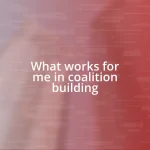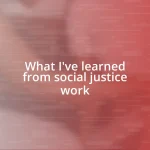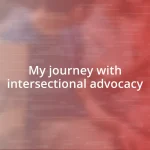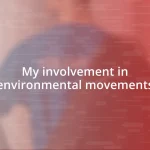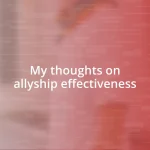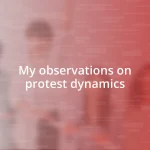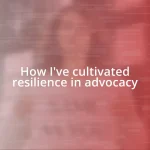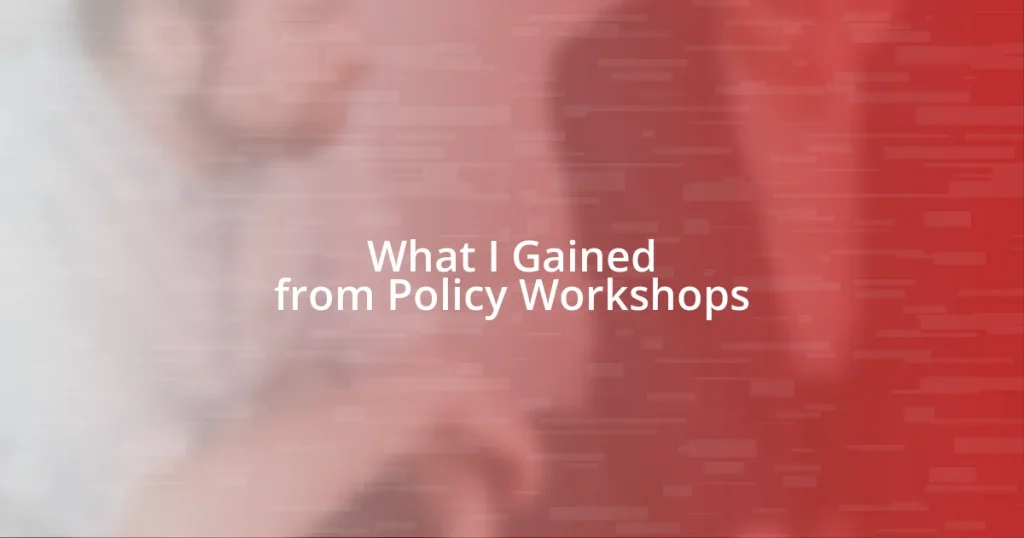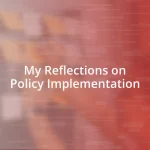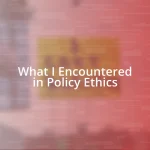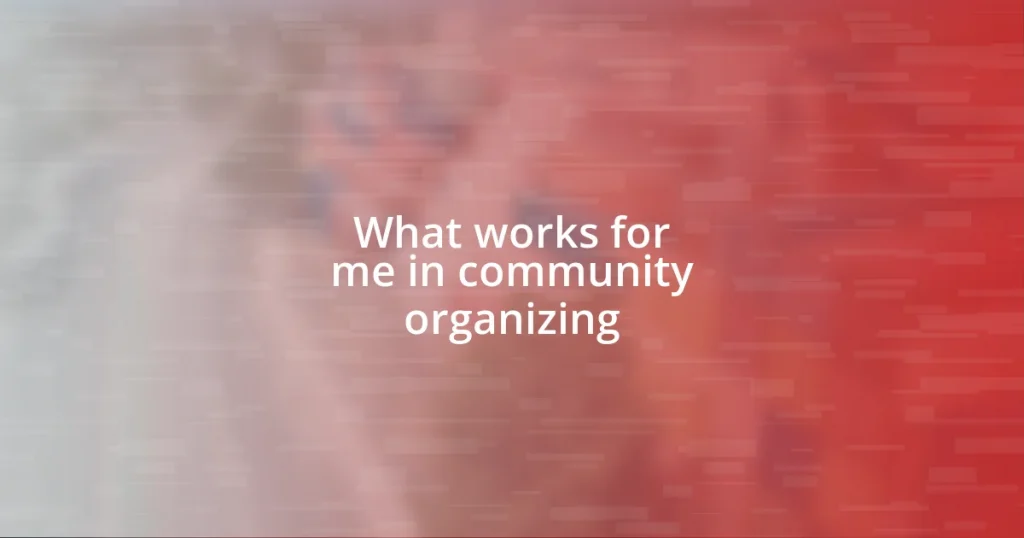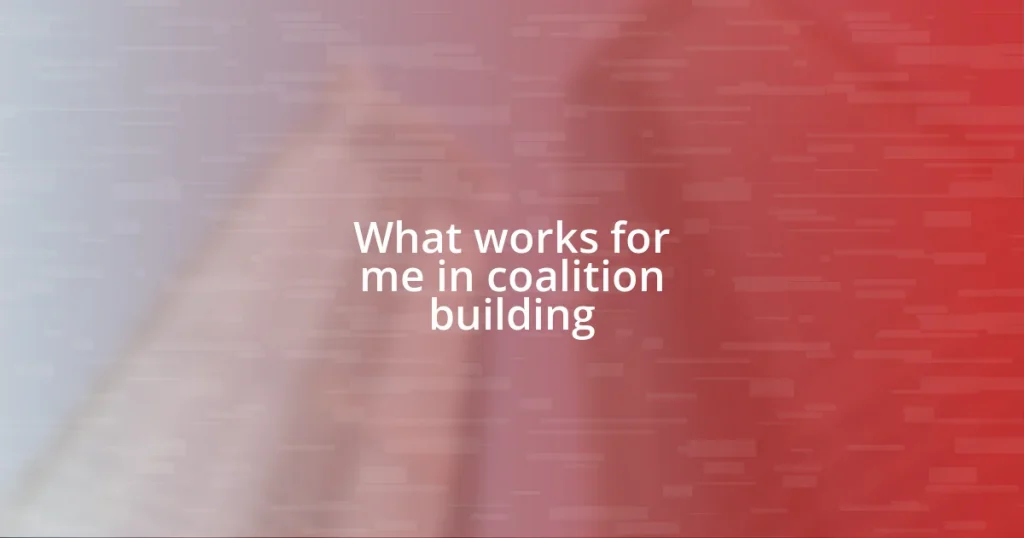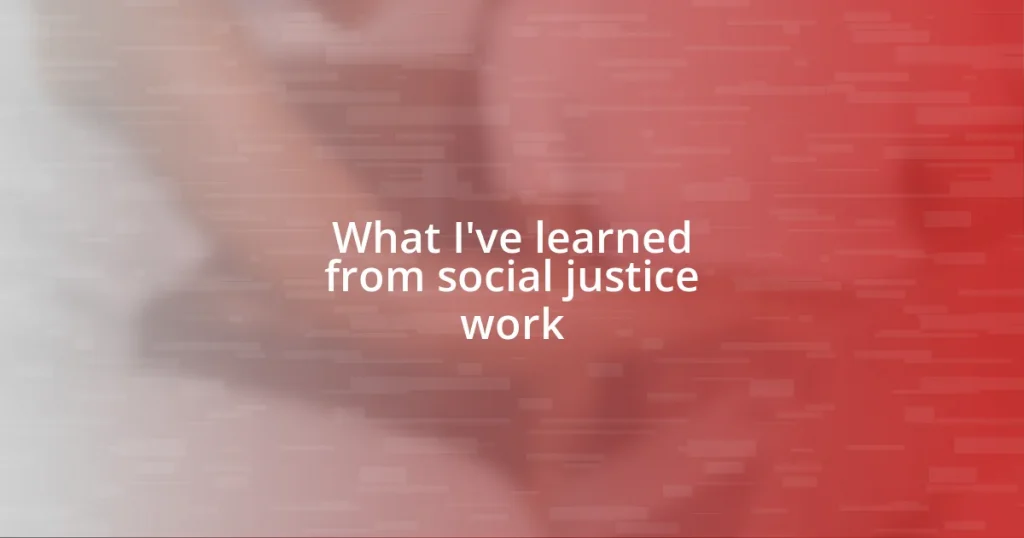Key takeaways:
- Workshops bridge theory and practice by fostering collaboration, creativity, and diverse perspectives that enhance problem-solving and innovation.
- Key skills developed include critical thinking, effective communication, and adaptability, which are essential for engaging in policy discussions and leading group dynamics.
- Networking opportunities during workshops lead to meaningful relationships, collaborative projects, and real-world applications of insights gained, enriching both personal and professional growth.
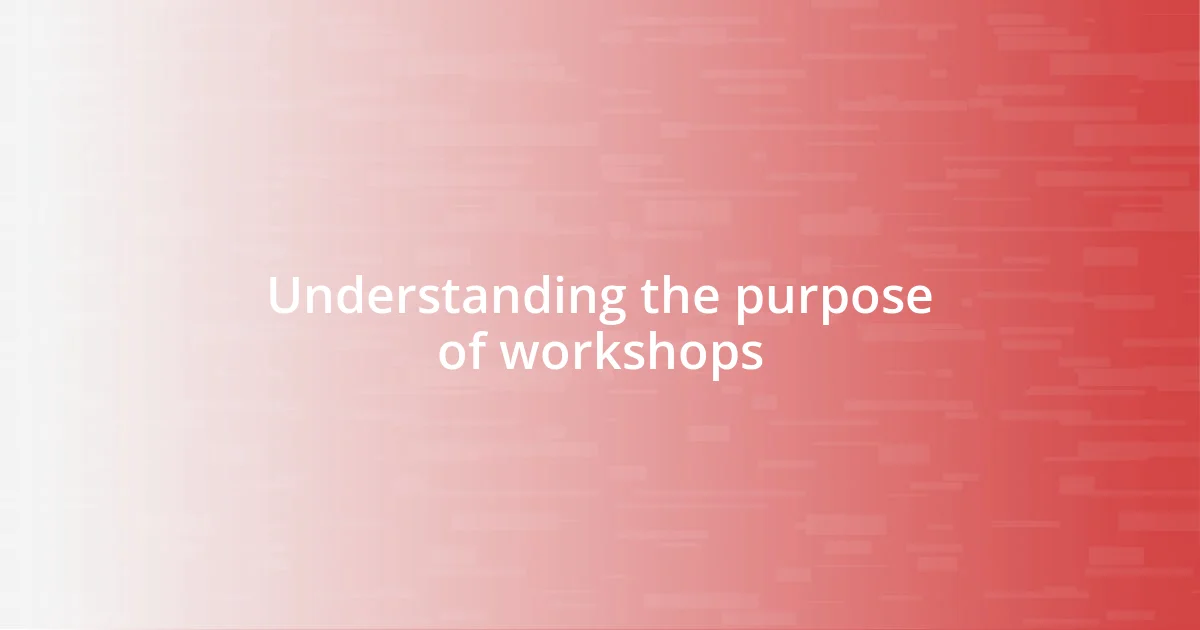
Understanding the purpose of workshops
Workshops serve as a bridge between theory and practice, allowing participants to engage directly with concepts. I remember the first workshop I attended; the energy in the room was palpable as everyone shared their insights and experiences. Isn’t it fascinating how a simple gathering can ignite such passion and motivate us to think critically about policy?
One of the great things about workshops is their collaborative nature. I once dealt with a particularly challenging policy issue, and during a workshop, the diverse perspectives of others opened my eyes to solutions I hadn’t considered before. It really made me wonder: how often do we limit ourselves by not seeking others’ viewpoints?
Additionally, workshops often create a safe space for creativity and innovation. I vividly recall brainstorming sessions where ideas flowed freely, leading to unexpected solutions. This made me reflect on the importance of an open dialogue; don’t we all thrive when our thoughts are valued and encouraged?
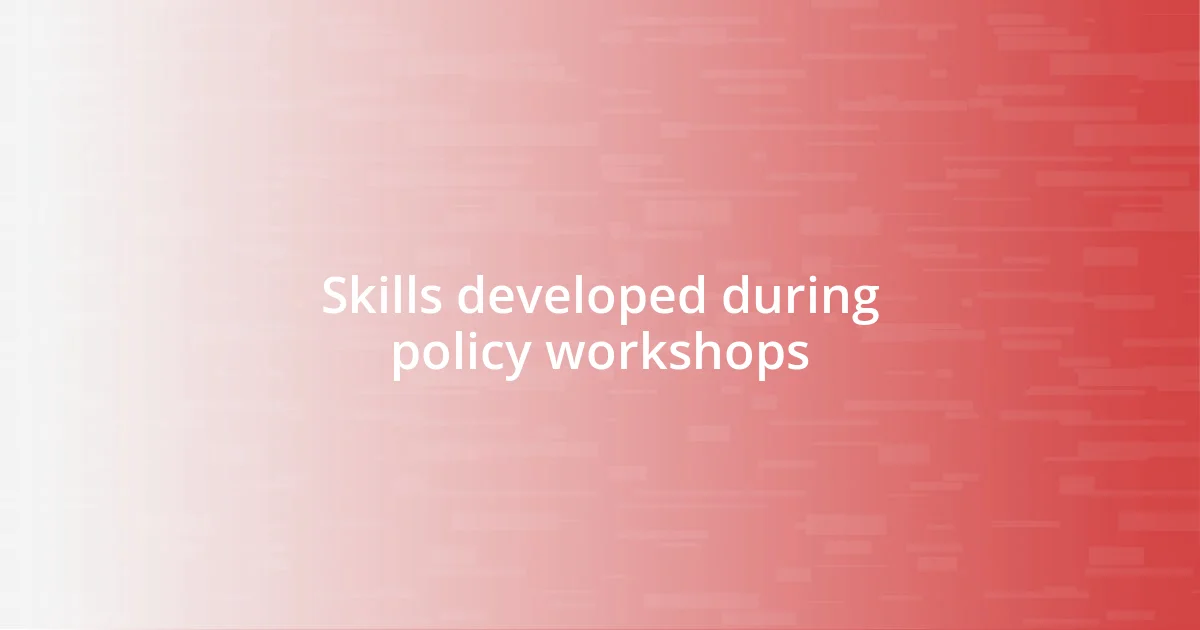
Skills developed during policy workshops
Workshops have a way of pushing us out of our comfort zones and honing essential skills. I found myself suddenly thrown into a debate during one session, which sharpened my ability to think on my feet. The adrenaline rush of articulating my thoughts clearly and concisely was both terrifying and exhilarating, driving home the importance of confident communication in policy discussions.
Here’s a peek at some key skills I developed through these engaging experiences:
- Critical Thinking: Challenging my assumptions and evaluating diverse viewpoints.
- Team Collaboration: Learning to work effectively with others toward a common goal, often surprising myself with the synergy we created.
- Effective Communication: Gaining the ability to express complex ideas simply and persuasively, which is vital in policy settings.
- Problem-Solving: Developing a knack for approaching challenges with innovative solutions, often sparked by collaborative brainstorming.
- Adaptability: Learning to pivot quickly and embrace feedback, which has become invaluable in fast-paced policy environments.
During one workshop, I vividly remember a scenario where I had to facilitate a group discussion. Facing my peers was daunting, but by the end, I felt a newfound confidence in my facilitation skills. It was a moment of clarity that reinforced how leadership is less about authority and more about guiding others to a shared understanding. This realization has transformed how I approach group dynamics, and I now cherish opportunities to lead discussions.
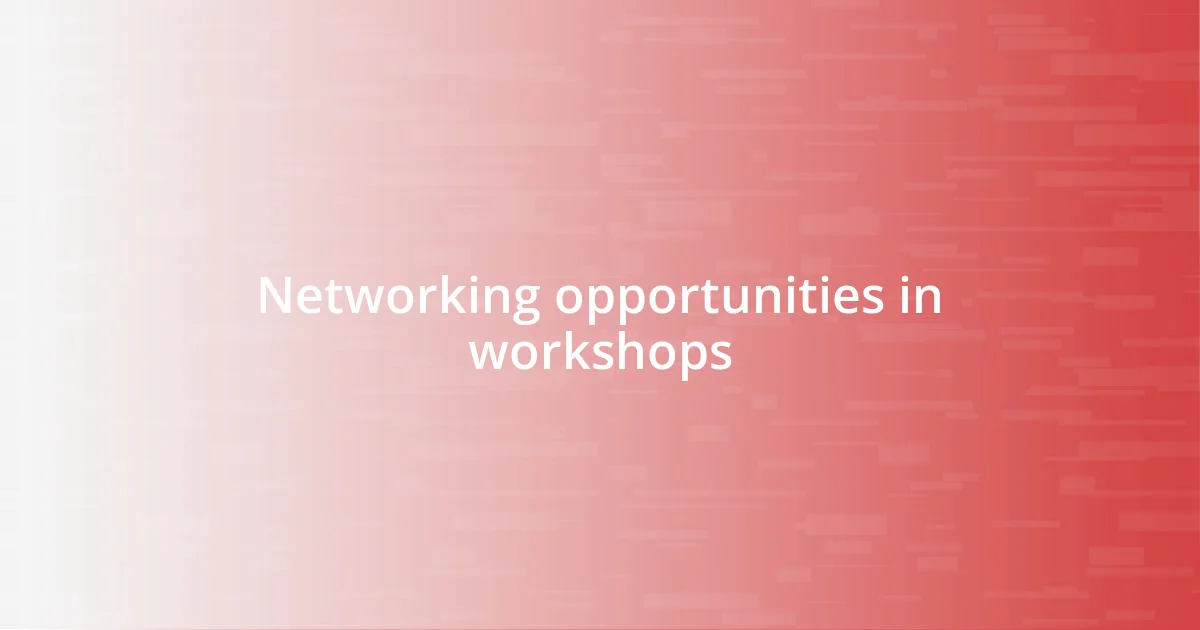
Networking opportunities in workshops
Networking opportunities in workshops provide an invaluable platform for building meaningful relationships. I remember during one workshop, I connected with a participant who shared similar policy interests. Our conversation sparked a collaboration that led to joint research—something I didn’t anticipate but found incredibly rewarding. Have you ever experienced a casual discussion that turned into a pivotal partnership? It really makes you think about the hidden potential in every interaction.
Moreover, these workshops often attract a diverse group of individuals, each bringing their unique backgrounds. I had a chance to exchange ideas with a seasoned policy analyst from a different sector. This interaction exposed me to fresh perspectives that enriched my understanding. It was an eye-opening moment, emphasizing the significance of networking where the blend of varied experiences can lead to remarkable insights. Isn’t it amazing how simply engaging with others can broaden our horizons?
Also, follow-up connections are often facilitated through workshops, laying the groundwork for future collaborations. At one event, I exchanged contact information with several participants, leading to ongoing discussions about policy initiatives. It has led to an expanded network that continues to benefit my work. The chance to nurture those relationships adds a layer of depth to the workshop experience—it transforms a one-time event into a sustained journey of learning and growth.
| Networking Benefits | Personal Experience |
|---|---|
| Diverse Connections | Engaged with diverse participants for broader insights. |
| Collaborative Opportunities | Formed a research partnership from a simple conversation. |
| Follow-Up Engagements | Continued discussions with network contacts on initiatives. |
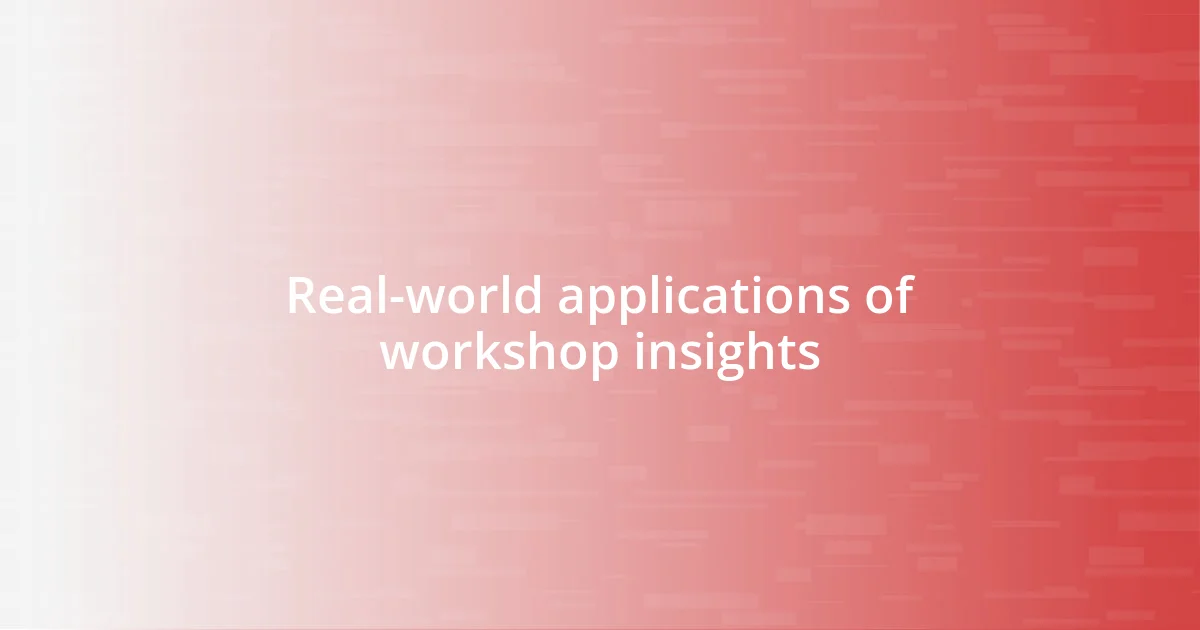
Real-world applications of workshop insights
One of the most striking real-world applications of workshop insights I’ve encountered is in advocacy efforts. During one workshop, I participated in a simulation where we crafted policy proposals under time constraints. This experience taught me the urgency of well-researched arguments. I remember presenting my group’s proposal to a mock legislative body. The feedback highlighted the importance of aligning our messaging with the interests of stakeholders—an insight I later applied in real advocacy situations. How often do we consider the audience when making proposals? I learned that tailoring communication can resonate powerfully and drive change.
Equally impactful was the emphasis on collaborative problem-solving in these workshops. I recall a brainstorming session where we faced the challenge of addressing housing instability. The diverse viewpoints shared during that discussion sparked an idea for a community initiative that I later championed in my own neighborhood. I’ve realized that what starts as a workshop exercise can bloom into actionable community projects. Isn’t it incredible how a single idea can transform lives?
Additionally, effective communication skills gained through these workshops have proven invaluable in professional settings. After mastering the art of succinctly conveying complex ideas, I felt more equipped to engage in discussions at my workplace. A pivotal moment came when I had to present a policy recommendation to my team. The clarity and confidence I had developed in those workshops allowed me to present my ideas persuasively. Have you ever noticed how the way we communicate can completely reshape a conversation? My experience reiterates the gravity of effective communication—it opens doors and strengthens our influence in policy discourse.
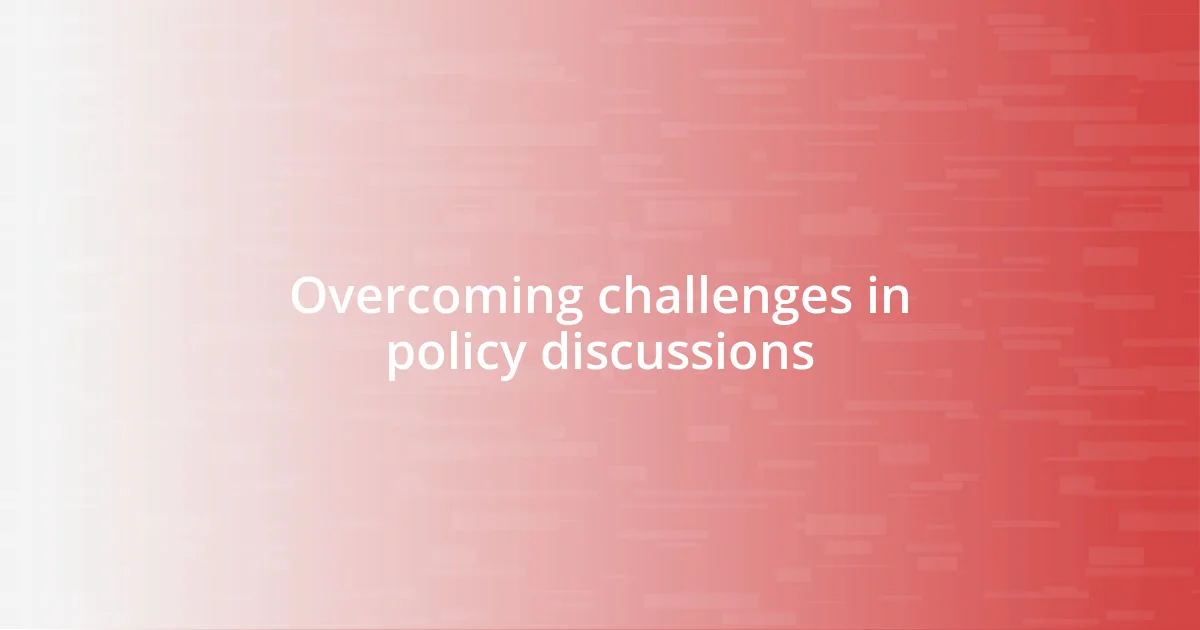
Overcoming challenges in policy discussions
One of the biggest challenges I’ve faced in policy discussions is overcoming differing opinions. During a particularly intense workshop, I found myself at odds with someone who held an opposing view on healthcare access. At first, I felt frustrated, but as I listened to their perspective, I realized the importance of empathy in discourse. Have you ever noticed how listening can sometimes turn opposition into opportunity? It was a powerful lesson for me—understanding the ‘why’ behind someone’s stance can pave the way for more constructive discussions.
Another hurdle I often encounter is the fear of speaking up. I remember a workshop where participants were asked to share their views on climate policy. My heart raced, and my mind went blank as I listened to others articulate their thoughts. But I forced myself to contribute, sharing my research on renewable energy. The positive reception I received boosted my confidence significantly. Isn’t it curious how confronting our fears can lead to growth? That experience taught me that stepping outside our comfort zones is crucial for making our voices heard.
Finally, navigating the complexities of policy language can be daunting. In one workshop, I struggled with the jargon often used in legal frameworks. I found myself hesitating to contribute, feeling overwhelmed by the technical terms. However, when a facilitator broke down these concepts into simpler language, everything clicked for me. I realized that clarification brings clarity, which encourages participation. Have you experienced a similar moment where the fog lifted and everything made sense? It was a reminder that effective communication is not just about using fancy terms; it’s about making ideas accessible to all.

